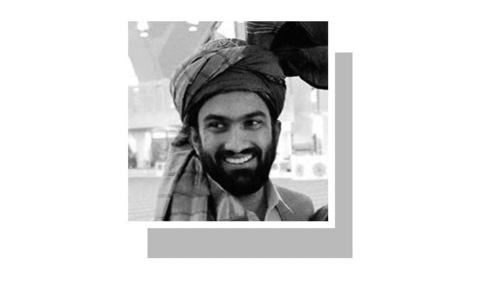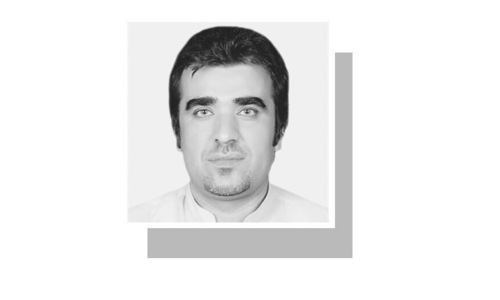KARACHI, Dec 30: The arrest of Shahzain Bugti, grandson of the slain Akbar Bugti, for possessing in his armed convoy an array of illegal arms has brought the focus back on the Bugti tribe as far as the Balochistan insurgency is concerned.
Baloch tribal elders and other influentials in the provinces, like leaders/workers of Pakhtunkhwa Milli Awami Party, are known to possess and carry smuggled arms. But none has ever been arrested in such a humiliating manner.
From Qila Saifullah to the Buleli checkpoint near Quetta, where Shahzain's convoy was intercepted, the tribal leader could have been arrested with a minimum of fuss at a number of other checkpoints and sites that dot the route.
Why was Buleli picked as the spot to interdict the Bugti convoy? Did the presence of the media not suggest they had been informed earlier?
Crucially, was the arrest meant as a message to other Baloch tribal leaders that they can also meet the same fate, or was it in fact an attempt to build up Shahzain as a hero, as argued by the critics of the establishment's role in Balochistan politics? Dawn
Speaking to on condition of anonymity, several politicians and observers of Baloch politics appeared to suggest that Shahzain Bugti's arrest is linked to his announcement many weeks ago that he intended to lead a 'long march' of tribesmen loyal to him and of workers belonging to his father's faction of the Jamhoori Watan Party.
The 'long march' was to end in Dera Bugti, the bastion of the Bugtis which has been without a leader since the killing of Akbar Bugti.
The leadership succession in the Bugti clan has been complicated by deaths and other problems. As the eldest son of Akbar Bugti, the heir apparent was Salim Bugti, but he has passed away.
Two other sons, Rehan and Salal, also passed away before Akbar Bugti's death.
His two surviving sons, Shahzain Bugti's father, Talal Bugti, and Jamil Bugti are not considered legitimate candidates to succeed Akbar Bugti. Talal Bugti because he had been expelled from Dera Bugti by the nawab himself. Jamil Bugti because Akbar Bugti had given him a share of the clan's property during his lifetime, thereby essentially disqualifying him.
Among the grandsons of Akbar Bugti, Mir Aali, Brahmdagh and Fahad are believed to have been very close to their grandfather. They were among the few who accompanied Akbar Bugti on his last journey from Dera Bugti to the cave where he was killed.
Even before Akbar Bugti's death, Brahmdagh left the hideout to wage a war to 'avenge' his grandfather's imminent killing, according to Baloch politicians.
This left the door open for Mir Aali Bugti who did become the 'nawab' (with the establishment's consent) relying on his right as the eldest son of Nawab Akbar Bugti's eldest son.
The ceremony to install Mir Aali Bugti as the new nawab was attended by Khan of Kalat Suleman Khan Dawood, chief of all Baloch sardars and nawabs; Sardar Ataullah Mengal; and other tribal chiefs. (A sardar is chief of only his tribe, whereas a nawab is chief of a group of tribes.)
With Mir Aali Bugti installed as nawab, the succession in the Bugti clan was ostensibly settled. But the ceremony was held in Sui, not Dera Bugti, and other problems meant the issue continued to linger.
Following the death of Akbar Bugti, Dera Bugti became a fertile ground for various groups to contest power.
The Kalpar branch of the Bugti tribe in particular made a comeback, having left Dera Bugti after falling out with Akbar Bugti over the Kalpars' participation in local government elections against Akbar Bugti's wishes.
To counter the growing challenges, Mir Aali Bugti sought the recruitment of 4,000 levies (essentially tribal policemen), but his request was turned down.
That refusal and, according to Mir Aali Bugti, other commitments that the establishment failed to meet led to the nawab leaving Sui within a couple of months.
Perhaps to fill the vacuum created by the absence of Mir Aali from Dera Bugti and counter the growing influence over Dera Bugti and Sui of the Kalpars and Wadera Ghulam Qadir Masori Bugti, an archrival of Akbar Bugti who was in the Bugti chief's captivity for many years, Shahzain Bugti intended to make a showy, triumphant entry and may have acquired weapons for that purpose and for his security, too.
However, Shahzain Bugti's father, Talal, claims the unlicensed arms were planted in his son's convoy.
While the facts have yet to be established, observers suggest the establishment should at the very least resist the temptation to interfere in the succession issue, given the risk it carries of destabilising the resource-rich area and by extension the entire province.













































Dear visitor, the comments section is undergoing an overhaul and will return soon.